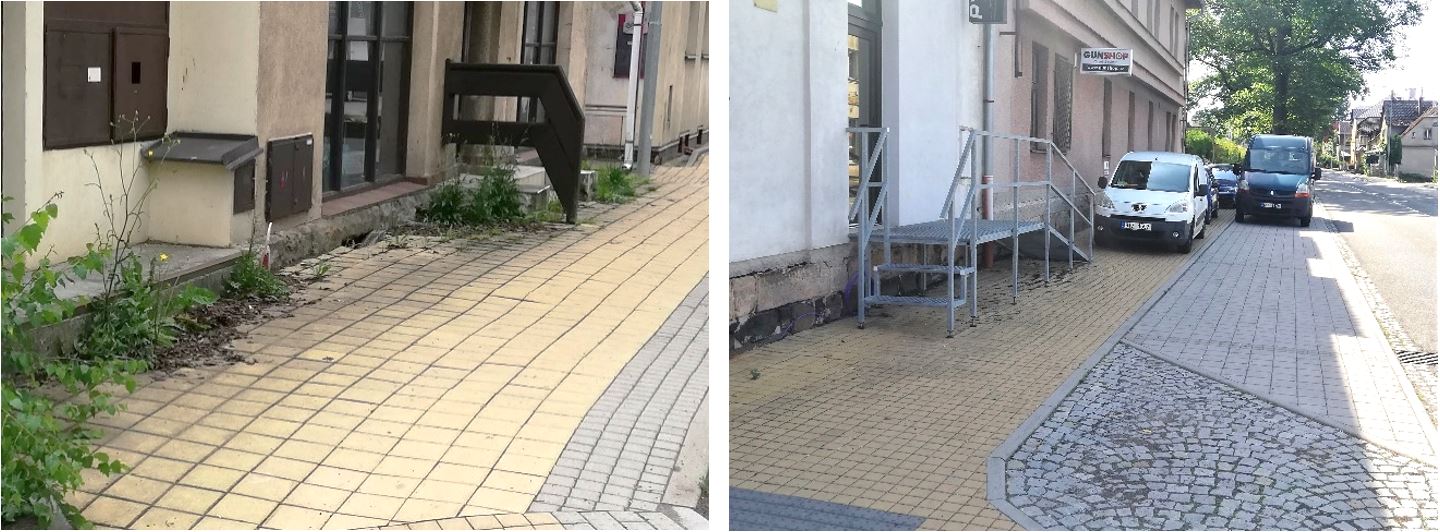The state and the EU gave CZK 9.5 billion to municipalities for the construction and reconstruction of pavements. It has, however, often failed to improve safety
PRESS RELEASE ON AUDIT NO 24/01 – 27 January 2025
Between the years 2014 and 2023, a state and EU financial aid amounting to CZK 9.5 billion was provided to municipalities for the construction and reconstruction of pavements and footpaths. The main aim was to make these walkways safer and more barrier-free. During the audit, the Supreme Audit Office (SAO) found that the financial aid was not always directed where it would bring the greatest benefit. Almost three quarters of the 23 projects audited showed serious deficiencies. The projects did not eliminate many bottlenecks and often did not ensure safe crossing for people with disabilities or reduced mobility. The SAO also found that some new pavements were not maintained by municipalities, were overgrown with vegetation or were blocked by parking cars, etc.
The number and severity of the deficiencies identified are indicative of the poor functioning of the system of financial aid. Moreover, administration of the system is demanding for both beneficiaries and providers. The SAO, therefore, recommends that the system be changed. "Safety and barrier-free pavements are of course important. However, the conditions of the aid do not sufficiently motivate the beneficiaries to use it effectively and economically. The amount of state and EU financial contribution is between 85% and 95%, and municipalities then finance reconstructions of roads which do not need much repairing with such a high level of subsidies. We are convinced that financial aid from the state should only supplement, not replace, municipal funding in this area. After all, it is the municipalities that own the pavements," said Jan Kinšt, a Member of the SAO who was responsible for the audit. According to him, the possibility of using alternative types of aid, such as loan guarantees, interest subsidies or repayable loans, should also be considered.
The audit has shown that neither the Ministry of Transport (MoT) nor the Ministry of Regional Development (MoRD) know what overall results they want to achieve by means of the aid, what results have been achieved nor what progress has been made. There was no proper monitoring of what was built with the state and EU financial aid. For example, the State Fund for Transport Infrastructure (SFTI) extended the deadline for the beneficiary to submit the final evaluation of the 2014-2015 project for a total of almost CZK 6 million sixteen times. The beneficiary did not submit the report until the time of the SAO audit in June 2024 and the SFDI did not approve it until the audit was completed. Nine years after completion, the project still remains unevaluated. The SAO carried out an on-site inspection and found a number of serious deficiencies which the SFDI will address with the beneficiary. While the condition of the pavements in the village has improved, pedestrian safety has not been significantly increased and some problem areas for people with disabilities or reduced mobility have not been resolved.
When selecting projects, the MoRD and SFTI based their selection on information provided by financial aid applicants without verifying it. At the same time, applicants often evaluated the initial situation in an excessively negative way while, on the contrary, exaggerating the benefits of the projects. In some cases, they declared that the reconstruction of a pavement or footpath would be the aim, but in the end it was only repairs - for which the financial aid was not intended.
Example of pavements after reconstruction: overgrown with vegetation or blocked by cars

The results of the individual project audits, including documentation, are available here:
https://www.nku.cz/assets/kon-zavery/k24001-priloha3.html (only czech)
Communication Department
Supreme Audit Office